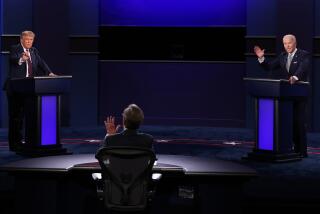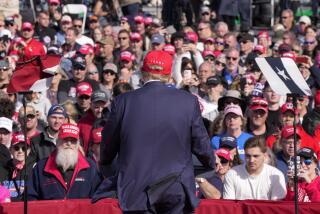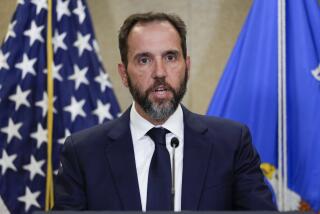Analysis:: Five weeks before becoming president, Donald Trump once again is spreading falsehood

White House Press Secretary Josh Earnest suggests Russian President Vladimir Putin was directly involved with “malicious cyberactivity to erode public confidence in our democracy.” Dec. 15, 2016.
Dawn had barely broken Thursday when Donald Trump once again broadcast via Twitter a provably false claim: that the Obama administration had not raised an alarm about Russian interference in the presidential election until after Hillary Clinton’s defeat.
In fact, on Oct. 7, the administration issued an official statement accusing the Russians of being behind the cyberattacks that appear to have harmed Clinton’s campaign.
“Only Russia’s senior-most officials could have authorized these activities,” the administration statement said at the time.
Nor was the issue a surprise to Trump. He had publicly called on the Russians in July to find and release Clinton’s emails. He talked in September about accusations of Russian hacking and commented on them during the fall presidential debates.
Still he added some equivocation to his false tweet Thursday: “If Russia, or some other entity, was hacking, why did the White House wait so long to act? Why did they only complain after Hillary lost?”
In another message Thursday, Trump accused the media of working “so hard to make my move to the White House, as it pertains to my business, so complex, when actually it isn’t!”
Except it was Trump and his team who specifically had cited the complexity of his business operations when they canceled a long-planned Thursday news conference that was supposed to explain how he’d separate his government duties from his business affairs while in office.
Those two tweets — along with one criticizing Vanity Fair magazine, which appeared to be retribution for a negative review of a Trump Tower restaurant — were the latest in a pattern for Trump. His communications seem aimed at keeping his supporters on the team, his opponents under fire and the rest of America distracted from larger unanswered questions about the president-elect’s plans.
It is a strategy that has helped Trump gather a band of enthusiastic supporters large enough to win the presidency — but poses the threat of further alienating those who did not side with him and with whom a more conventional president-elect might want to ingratiate himself during his preinaugural period.
A McClatchy-Marist poll released Thursday demonstrated both the rationale for and the risks of Trump’s tactics. Asked about Trump’s tweets, two-thirds of American voters cast them as “reckless and distracting” compared with 1 in 5 who found them “effective and informative.”
There was a sharply partisan cast to the findings, but even among Republicans, nearly 2 in 5 disapproved of his communications. More than half of those who called themselves “strong Republicans,” however, had a favorable view of Trump’s tweets.
“He has been talking mostly to his base and has not been reaching out,” said poll director Lee Miringoff. “At some point that could become a problem, though we are not at that point yet.”
One of the challenges for Trump will be making sure that his regular entreaties on social media don’t work against him as he seeks to build support for his goals.
In the case of the Russian hacks, for example, his repeated disavowal of the unified judgment of U.S. intelligence that Moscow was behind the hacking — as well as insults leveled at the CIA and his own sympathetic views toward the foreign power — could complicate his desire to win support for his secretary of State nominee, Rex Tillerson. The Exxon Mobil chief executive has close ties to President Vladimir Putin from many years of doing business in Russia.
More broadly, any president needs to have a trust-based relationship with the country he leads, particularly in times of crisis.
“That only works if the president has credibility,” Rep. Adam B. Schiff, a Democrat from Burbank and member of the House Intelligence Committee, noted at a recent breakfast with reporters sponsored by the Christian Science Monitor.
“So when you have a president-elect that sends out patently false information … that impugns the credibility of the [presidency], and at some point the president is going to need to be believed by the country,” Schiff said.
Trump’s Russia tweet marked the second time in four days that he has falsely asserted that the Obama administration did not say anything in public about the Russian hacking until after the election.
He seemed to be trying to frame concerns about Russian intervention in the election as an effort to delegitimize his victory. In fact, many of those alarmed about the matter — a group that includes Republicans — have said that there’s no indication the intervention cost Clinton the White House, and that their concern rests with the larger issue of Russian duplicity.
Trump spokesman Jason Miller hit the legitimacy theme Thursday when asked about Trump’s tweets earlier in the day.
Trump opponents have “got to realize that the election from last month is going to stand, whether it’s the recount or continued questions along this line,” he said. “We’re moving ahead and put together a successful administration that’s ready to go to work serving the American people.”
Lyn Van Swol, a University of Wisconsin-Madison communications professor who has studied political deception, said Trump in some ways fits the model of those who dissemble — they tend to be verbose, as if concocting a structure of support for their misstatements.
But Trump also uncommonly commits falsehoods to writing — via Twitter. That’s rare because it is “much more high-stakes, much more permanent,” she said. Nor does he adjust his assertions after being informed — in Trump’s case repeatedly — that he is wrong.
“He’s unusual,” she said. “I don’t know if it’s self-deception, where someone coming in with a different opinion doesn’t matter, or it’s strategic, where repetition increases the suggestion of truth…. The more it’s repeated, the more it’s believed.”
Trump is not the first president to spread falsehoods. Indeed, a president to whom he has compared himself, Ronald Reagan, often repeated anecdotes that were proved to be made up. The fact that he was so infrequently punished for it contributed to the nickname “Teflon president.”
But Reagan was also far more popular as he entered the presidency than is Trump, who won a historically narrow victory despite his repeated assertions that his win was a landslide.
In addition, Reagan’s stories were often about the distant past or unspecified people illustrating themes he wanted to stress. Trump’s tweets, by contrast, often include falsehoods about recent, clearly specified events.
And, unlike Trump, the more upbeat Reagan didn’t use his words as retribution for personal slights.
Trump’s recent criticism of Boeing’s Air Force One contract — using exaggerated figures — came shortly after a Boeing official questioned his trade policy, and resulted in an immediate drop in the company’s stock. Trump later asserted that he had not known about the Boeing official’s comments about trade.
On Thursday, he appeared to retaliate against a negative Vanity Fair review of the Trump Tower restaurant by criticizing the magazine’s editor, Graydon Carter, and its financial standing. (The two men have a long history of disputes. When he was the editor of Spy magazine a quarter-century ago, Carter called Trump a “short-fingered vulgarian,” which morphed in the 2016 primaries into references about Trump’s allegedly small hands, and other body parts.)
“Has anyone looked at the really poor numbers of Vanity Fair Magazine,” Trump wrote. “Way down, big trouble, dead! Graydon Carter, no talent, will be out!”
Trump has vowed to mute his Twitter activities somewhat when he becomes president. Until that happens, his campaign spokesman on Thursday seemed to have come up with a strategy to stay out of his way.
“I’d let the president-elect’s tweets speak for themselves,” Miller said.
Twitter: @cathleendecker
More to Read
Start your day right
Sign up for Essential California for news, features and recommendations from the L.A. Times and beyond in your inbox six days a week.
You may occasionally receive promotional content from the Los Angeles Times.







